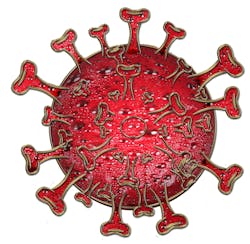Genalyte obtains FDA EUA for rapid COVID-19 antibody test
Genalyte, a point-of-care (POC) diagnostics and analytics company, announced its SARS-CoV-2 Multi-Antigen Serology Panel has received Emergency Use Authorization (EUA) from the U.S. Food and Drug Administration (FDA), according to a press release. The panel tests for the detection of IgG and IgM antibodies the body produces in response to the novel coronavirus (SARS-CoV-2).
Genalyte’s Multi-Antigen Serology Panel and its FDA-cleared Maverick diagnostic system will further expand nationwide antibody testing, by providing a high-quality and rapid testing solution that deliver lab-quality results in 20 minutes at POC locations. The SARS-CoV-2 Multi-Antigen Serology Panel is expected to become an increasingly important tool as serology-based antibody testing expands in the fight against COVID-19.
“Our SARS-CoV-2 Multi-Antigen Serology Panel and Maverick instrument provide a much-needed, rapid testing solution that can help people understand if they have been previously infected with SARS-CoV-2,” said Cary Gunn, founder and Chief Technology Officer at Genalyte. “It enables healthcare professionals to confidently provide accurate, serological results in clinical and public health settings—which then enables them to better estimate how many people have been infected with SARS-CoV-2, the virus that causes COVID-19, and helps guide a better understanding of the virus.”
Ashraf Hanna, CEO at Genalyte, added, “An effective COVID-19 vaccination program will benefit from accurate, reliable serology testing. We are pleased to receive the Emergency Use Authorization from the FDA and look forward to being part of the solution in combating COVID-19.”
Genalyte’s SARS-CoV-2 Multi-Antigen Serology Panel tests for IgM and IgG antibodies against 13 unique viral antigens. IgG antibodies, in particular, remain long after a person has recovered and are believed to be a marker of sustained immunity, although the duration of immunity to SARS-CoV-2 needs continued study. Utilizing a machine learning approach, the panel is able to virtually eliminate false positives, achieving 98 percent specificity and 96 percent sensitivity.

